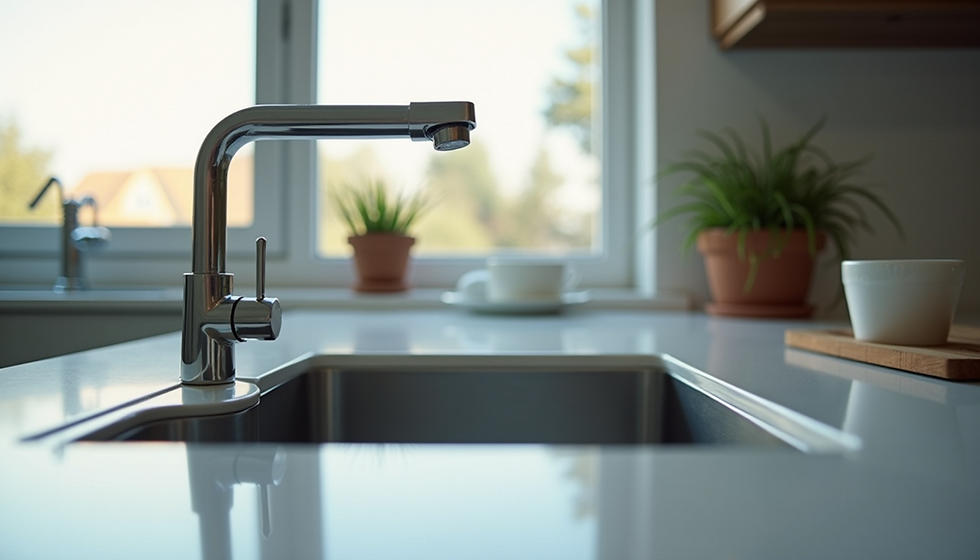Understanding the Causes of Blocked Drains and How to Prevent Them
- Wilkins Plumbing Works

- Aug 28, 2024
- 3 min read

Blocked drains are a common household issue that can lead to serious plumbing problems if not addressed promptly. Whether it's a slow-draining sink, a clogged shower, or a completely blocked toilet, understanding the causes of blocked drains can help you prevent and resolve these issues effectively. Let’s dive into the most common causes and explore some practical tips to keep your drains clear.
1. Hair and Soap Scum Build-Up
One of the most frequent culprits of a blocked drain is hair combined with soap scum. In bathrooms, hair tends to get washed down the sink or shower drain, where it can bind with soap residue and create a sticky mess. Over time, this mixture can build up and obstruct the flow of water.
Prevention Tips:
Use a drain guard or hair catcher in sinks and showers.
Regularly clean out hair and debris from these guards.
Avoid rinsing large amounts of hair down the drain.
2. Grease and Food Scraps
In kitchens, grease and food scraps are common offenders. When grease is poured down the sink, it can solidify as it cools, creating a sticky coating inside the pipes. Food scraps, especially starchy ones like potato peels, can also contribute to blockages as they break down and combine with grease.
Prevention Tips:
Avoid pouring grease down the sink. Instead, collect it in a container and dispose of it in the trash.
Use a sink strainer to catch food scraps.
Regularly clean the strainer and the area around the sink.
3. Foreign Objects
Sometimes, drains get blocked by foreign objects that shouldn’t be flushed or washed down. This includes things like sanitary products, wipes (even those labelled flushable), and small toys.
Prevention Tips:
Dispose of sanitary products and wipes in the trash, not the toilet.
Educate family members, especially children, about what should and shouldn’t go down the drain.
4. Tree Roots
In some cases, tree roots can invade underground drainage pipes, particularly if there are cracks or joints in the pipes. The roots seek out the moisture in the pipes and can cause blockages by growing into them.
Prevention Tips:
Ensure that any large trees are planted away from sewer lines.
Regularly inspect your plumbing system for signs of root intrusion.
5. Pipe Misalignment or Damage
Sometimes blockages are caused by structural issues with the pipes themselves. Pipes can become misaligned or damaged due to ground movement, age, or poor installation. These issues can restrict water flow and trap debris.
Prevention Tips:
Have your pipes inspected periodically by a professional plumber.
Address any signs of pipe damage, such as unusual noises or slow drainage, promptly.
6. Mineral Build-Up
In areas with hard water, mineral deposits can accumulate inside pipes over time. This build-up, often called limescale, can restrict water flow and eventually cause blockages.
Prevention Tips:
Use water softeners to reduce mineral build-up.
Regularly clean your drains with natural descalers like vinegar and baking soda.
How to Address a Blocked Drain
If you find yourself dealing with a blocked drain, here are some steps to take:
Use a Plunger: A plunger can often clear minor blockages. Make sure you’re using the right type for the job—there are different plungers for sinks, showers, and toilets.
Try a Drain Snake: For more stubborn blockages, a drain snake or auger can help break up or remove the obstruction.
Use Chemical Drain Cleaners Sparingly: While effective, chemical drain cleaners can be harsh on pipes and the environment. Use them sparingly and follow the manufacturer’s instructions carefully.
Call a Professional: If the blockage persists or you suspect a more serious issue (like tree root invasion or pipe damage), it’s best to call a licensed plumber. They have the tools and expertise to diagnose and fix the problem properly.
Conclusion
Blocked drains are a hassle, but with a bit of knowledge and proactive care, you can prevent most common issues. Regular maintenance, mindful practices, and timely intervention can help keep your plumbing system running smoothly. By understanding and addressing the root causes of blocked drains, you can save yourself time, money, and a lot of frustration.



